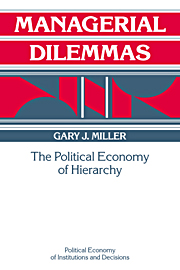Series editors' preface
Published online by Cambridge University Press: 05 June 2012
Summary
This Cambridge series – The Political Economy of Institutions and Decisions – is built around attempts to answer two central questions: How do institutions evolve in response to individual incentives, strategies, and choices; and how do institutions affect the performance of political and economic systems? The scope of the series is comparative and historical rather than international or specifically North American, and the focus is positive rather than normative.
In this innovative study, Gary Miller tackles head-on a fundamental dilemma in the organizational economics literature. While the economic rationale for the existence of hierarchy is based on its capacity to correct market failure, this correction unavoidably creates consequences that are incentive incompatible between self-interested superiors and subordinates. How can managers inspire members of an organization to transcend the sort of self-interested behavior that results in shirking? Miller argues that those organizations whose managers can inspire members to transcend short-term self-interest will always have a competitive advantage. He employs modern game theory to provide a rigorous analysis of cooperation and political leadership in hierarchies.
This study bridges the literature on organizational economics and that on organizational behavior to provide new insights into the structure of hierarchies. In the context of the analysis of repeated games, the traditional concepts of cooperation, culture, trust, commitment, and leadership take on a richer meaning.
- Type
- Chapter
- Information
- Managerial DilemmasThe Political Economy of Hierarchy, pp. xi - xiiPublisher: Cambridge University PressPrint publication year: 1992

